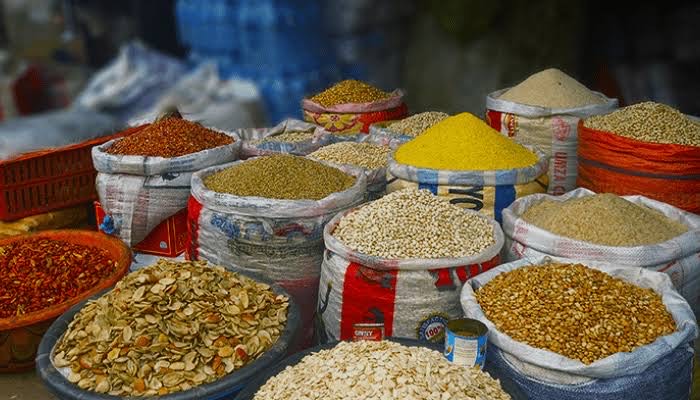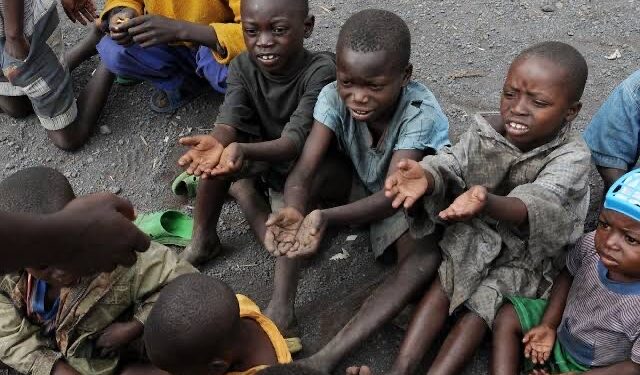Millions of Nigerians are celebrating Salah with hunger, anger, and frustration. The suffering began before the season and was worsened by the current government imposing harsh economic reforms on the people without any palliatives.
The double blow of the floating Naira and the removal of the petrol subsidy have brought the economy to an unprecedented halt. For the low-income groups, who make up over 70 percent of the population, food prices have skyrocketed and are not expected to come down anytime soon, making life in the country harder than in war-torn areas.
According to inflation statistics released by the National Bureau of Statistics (NBS) over the weekend, food inflation rose to 40.66 percent year-on-year in May 2024.
This was a significant increase from 24.82 percent in May 2023 and slightly higher than 40.53 percent in April 2024.
This sudden rise in food prices is due to various factors affecting different food categories.
According to the agency, the main items driving this inflation are semovita, oatmeal, packaged yam flour, garri, beans, bread, cereals, potatoes, yams, other tubers, palm oil, vegetable oils (fats), cod, mudfish, and crayfish (fish), beef head, live chicken, pig head and bushmeat (meat).
On a month-on-month basis, food inflation remained at 2.
28% in May 2024, down from 2.50% in April 2024. Families are now scavenging through trash bins to make ends meet. On July 13, 2023, President Bola Tinubu declared a state of emergency to combat rising food prices and their impact on the Nigerian population.
Since then, food prices have risen as government authorities continue to feign helplessness. Social scientists have repeatedly sounded the alarm and called on the Federal Government to declare a true state of emergency on food insecurity to avert a looming humanitarian crisis.

There are legitimate concerns that the steady rise in food prices is further exacerbating the potential ruin of vulnerable families. Inspections at some major markets in Lagos revealed that a 50kg bag of foreign-sourced long grain rice, which cost 72,000 naira about two weeks ago, is now selling for 78,000 naira, while locally-sourced branded rice, which previously cost 62,000 naira, is now selling for 68,000 naira. A 50kg bag of oroyin (honey beans) that once sold for 100,000 naira is now trading at 140,000 naira, a 100kg bag of oroyin (honey beans) that previously sold for 150,000 naira is now trading at 280,000 naira.
A 20kg bag of yellow garri that previously sold for 35,000 naira is now trading at 47,000 naira, a 20kg bag of white garri that previously sold for 33,000 naira is now trading at 47,000 naira and a paint bucket filled with yellow and white garri is now trading at 3,700 naira. A large basket of tomatoes that previously sold for between N95,000 and N100,000 is now selling for N145,000 to N150,000, and a 50kg bag of pepper (rodo) that previously sold for N90,000 is now trading for N140,000. A large tuber of yam that was sold for N4,000 a few weeks ago is now trading for around N6,000. This horror is not limited to Lagos.
Market surveys conducted by journalists at Kabusa and Garki markets over the weekend revealed worrying developments. Prices of yams, beans, tomatoes, ram, beef, and rice have doubled in the past 48 hours.
Small yam tubers were sold for N2,500 (instead of N1,800 and N1,500). The same was true for another type of small yam tuber known as “water yam”, which sold for N1,500 instead of N1,000. White beans “Mudu”, which previously went for N2,200, are now N2,900. The price of a mudu of brown beans is now 3,600 naira (it was 2,800 naira then).
Inflation has also affected the price of rice. A mudu of locally grown rice is now 3,000 naira (it was 2,500 naira then). A kilo of beef now costs 7,000 naira (it was 6,000 naira before). A consumer bought four pepper seeds for 200 naira. A small basket of tomatoes was being sold for between N100 and N1,500 instead of N800.
Fatima Bello, president of the Smallholder Women Farmers Association of Nigeria (SWOFON), diagnosed the problem, saying the removal of fuel subsidy was affecting the suffering. Bello explained that most farmers who practice irrigation farming cannot afford fuel at the current official price of N617, especially during the dry season.
This has led some to cut production costs or abandon their farmland.
“We use pumps, but the pumps are not solar-powered.” Most of the people who do irrigation farming have reduced their acreage or stopped farming altogether because they can’t pay the bills anymore, and that will affect smallholder families too.

“You produce for your family, so it passes from your family to the community. What little you get, you keep for your household finances. “The fuel subsidy has long since been abolished, but we the people are also contributing to the problem because we are taking advantage of the situation to increase the need.” As a solution, she suggested that “fuel subsidy should be reviewed.” Transportation costs would automatically fall. Farmers need fertilizer, seedlings, etc. They need cash to get back to their farms.
Smallholder farmers make up about 70 percent of the workforce, and over 80 percent of them live in rural areas.
Furthermore, Comfort Sunday, FCT coordinator of SWOFON, complained about the lack of arable land in the FCT and the distribution of toxic fertilizers. And there is a lack of adequate and regular training in modern farming methods.
Sunday advised authorities to dig boreholes and build water tanks around farms so that farmers can farm all year round. Among other things, she encouraged governments to implement the Maputo Declaration, which recommended that African countries allocate 10 percent of their national budgets to agriculture.
“We want governments to train farmers on climate change, which will affect us severely. If we sow this year, the birds will carry away the seeds and grains because of the lack of rain.
“Some farmers are forced to sow the same land at least three times. Most farmers don’t even try to replant because they don’t have money to buy grains or seedlings for replanting.
“We also need the government to provide more wells or build reservoirs around our farms so we can start dry season farming. We need pump sprayers to spray the water faster.
“We also need land. The FCT administration should allocate farmland to registered farmers. If you look, you will see that developers are grabbing land everywhere.
Airport expansion has undermined our country. We must feed and look after our children.
“Government must know the best fertilizer to allocate to farmers so that they do not ingest poison in the guise of increased yields. Not all fertilizers are good. The Maputo Declaration should be implemented.”
Also, FCT Chairman of the All Farmers Association of Nigeria (AFAN), Mr Nkechi Okafor on Sunday acknowledged the concerns raised over farmers’ purchase of expensive inputs. Okafor said it would be difficult for the government to control food prices without subsidies on farm inputs such as fertilizers and pesticides.
Insecurity and climate change were among the biggest headaches that needed to be addressed. “We are aware of the cost of operational resources. You know that the cost of raw materials affects the cost of food. If farmers buy their inputs at a very high price, even the government cannot control the selling price.” So even if you can’t subsidize farmers’ inputs, they have the right to buy at whatever price they want and sell at whatever price they want.
“There’s also uncertainty. This is a very difficult problem, so it’s not something I was going to tackle initially. Farmers don’t actually go to their farms. You know that a lot of the food we consume in cities is produced in villages.”
Most rural areas are uninhabitable because of insecurity, so when farmers control the food we eat, they can’t control the price. “Every day we see horrific news about insecurity, farmers being killed, women being raped, farmland being destroyed, people being kidnapped for ransom.” Which farmer has one million naira to pay the ransom?
So, considering how much compensation they would have to pay if captured, they would choose not to live on their farms and food cannot go to the city. “We get food from farmers in the countryside but these places are danger zones because of insecurity. Apart from that, there are some diseases that ruin tomatoes and peppers. When you have such problems, food costs inevitably go up.”
Farmers are afraid of their insurance because if there are no floods or disease outbreaks at the end of the year, they will lose their insurance money. Proposed solutions include bulk imports of food and other essentials as the federal government grapples with insecurity and other challenges affecting local food production.
Joel Oruche, Director of Information at the Federal Ministry of Agriculture and Food Security, did not answer calls or respond to text messages when contacted on the phone for comments.

































